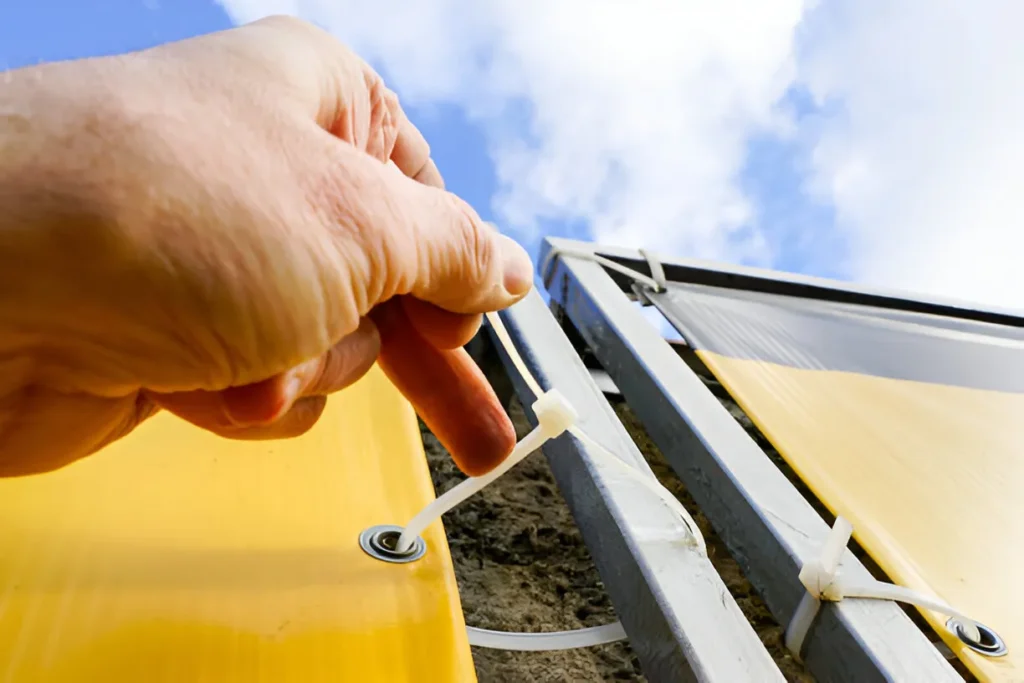How Are Cable Ties Made
Have you ever wondered how are cable ties made? Cable […]
阅读更多
Are your cable ties up to the challenge of withstanding harsh weather conditions?While standard nylon cable ties are suitable for indoor use, they may not be the best choice for outdoor applications. Weatherproof cable ties are specifically designed to endure exposure to sunlight, moisture, and extreme temperatures.
This blog post will explore the world of weather resistant cable ties, their properties, and when to use them for outdoor applications.
Standard nylon cable ties are versatile fasteners widely used in various industries. These ties feature a flexible strap with a ratchet mechanism for secure bundling. Made from durable nylon, they offer good tensile strength and resistance to chemicals.
Standard nylon ties perform well in indoor environments but may degrade when exposed to prolonged UV radiation or extreme weather conditions.
Uv resistant tie wraps are designed for outdoor applications. These ties incorporate UV stabilizers in their nylon composition, enhancing their resistance to sunlight and weathering.
Uv rated tie wraps ties maintain their strength and flexibility for extended periods when exposed to outdoor elements. They are ideal for securing cables and wires in solar installations, outdoor lighting systems, and other exterior applications.
Stainless steel cable ties offer superior strength and durability compared to their nylon counterparts. These ties are highly resistant to corrosion, heigh temperature, and harsh chemicals.
Stainless steel ties are suitable for demanding environments such as marine applications, industrial settings, and high temperature areas. They provide a secure and long-lasting solution for heavy-duty cable management needs.
Various specialty cable ties cater to specific requirements. Heat resistant zip ties withstand high temp in automotive and industrial applications. Releasable ties allow for easy removal and reuse, ideal for temporary installations or frequent adjustments.
Other specialty ties include low-profile designs, extra-long lengths, and ties made from alternative materials like PTFE for unique environmental challenges.


UV radiation significantly impacts cable tie durability. Prolonged exposure to sunlight can cause standard nylon ties to become brittle and lose tensile strength. UV rays break down the polymer chains in the nylon, leading to discoloration and eventual failure. UV resistant cable tie incorporate stabilizers to mitigate these effects, extending their lifespan in outdoor environments.
Moisture exposure affects cable tie performance. Water absorption can cause nylon ties to swell and weaken, potentially compromising their holding capacity. Repeated cycles of wetting and drying accelerate degradation. High humidity environments may also promote mold growth on the ties. Stainless steel ties offer superior resistance to moisture-related issues, making them suitable for wet conditions.
Extreme temperatures challenge cable tie integrity. High heat can soften nylon ties, reducing their strength and potentially causing them to loosen. Conversely, cold temperatures can make nylon brittle and prone to cracking. Specialty heat resistant zip ties maintain their properties in high temp applications. Stainless steel ties exhibit excellent performance across a wide temperature range, from freezing to extreme heat.
Chemical exposure poses risks to cable tie durability. Industrial pollutants, cleaning agents, and oils can degrade nylon ties over time. Salt water is particularly corrosive, affecting both nylon and metal ties. Stainless steel ties offer superior chemical resistance but may still be vulnerable to certain corrosive substances. Specialized ties made from materials like PTFE provide enhanced chemical resistance for extreme environments.
Selecting the appropriate weatherproof cable ties begins with evaluating the environment. Consider factors such as UV exposure, moisture levels, temperature ranges, and chemical presence. Outdoor applications may require zip ties uv, while marine environments demand corrosion-resistant options. Assess the specific challenges posed by the installation location to determine the necessary weatherproofing properties.
Determine the tensile strength and size requirements for the cable ties. Consider the weight and diameter of the cables or wires being bundled. Heavier loads and larger diameters necessitate stronger ties with higher tensile strength ratings. Ensure the selected ties can accommodate the bundle size and withstand the expected mechanical stresses over time.
Analyze the material properties of different weatherproof cable ties options. UV-resistant nylon ties often incorporate stabilizers to enhance durability, while stainless steel ties offer superior strength and corrosion resistance.
Consider additional properties like temperature resistance, chemical compatibility, and flammability ratings. Look for relevant certifications, such as UL or MIL-SPEC, which validate the tie’s performance in specific conditions.
Compare the benefits and limitations of zip ties uv and stainless steel zip ties. UV rated zip ties provide good weatherability and are lightweight, making them suitable for general outdoor use.
However, they may not match the strength and durability of stainless steel ties in extreme environments. Stainless steel ties excel in applications involving heavy loads, high temperatures, and corrosive conditions, but they come at a higher cost. Consider the specific requirements and budget constraints when making a selection.


Weatherproof cable ties are essential for outdoor applications. UV rated cable ties and cable ties metal offer durability against environmental factors. Choosing the right tie involves assessing conditions, strength requirements, and material properties.
Invest in high-quality, weatherproof zip ties to ensure reliable performance in demanding outdoor environments.